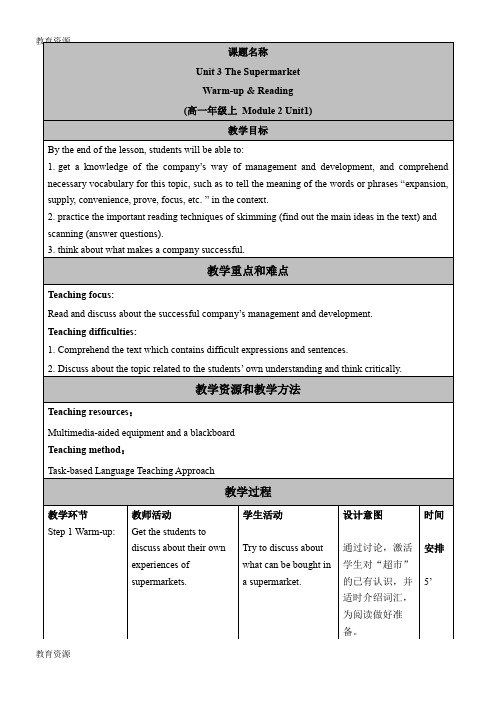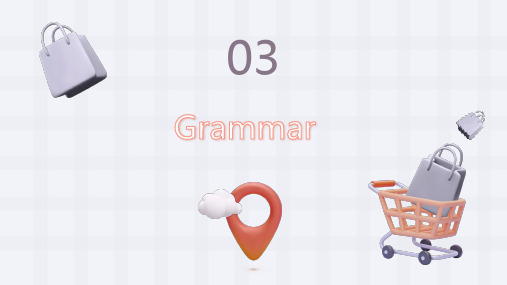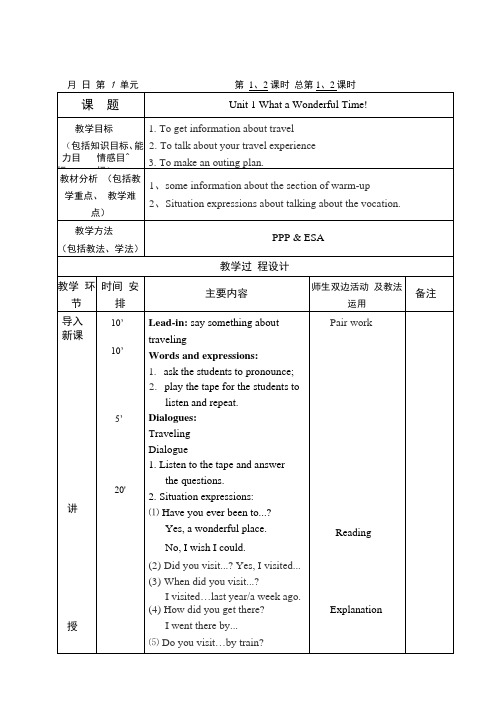BookⅡ Unit3 At the Market教案
unit 3 At the market!

Unit 3一.词语知识(尝试英汉互译)。
1.改变_______________2.大小,尺码_______________3.鼓励,支持__________________4.运动_______________5.挑战____________________6.浪费_______________7.celebrate ____________________ 8.plastic________9.in public ___________ 10.expect_________二.固定搭配1. Buy Nothing Day “不消费日”是抗议消费主义的一个非正式日子。
消费者24小时拒绝购买任何商品,显示消费者力量。
2. kick off “开始”e.g. We will kick off the meeting by discussing our goals for the group.我们将在会议开始的时候讨论我们这个团队的目标是什么。
“(足球比赛等)开球,开始”e.g. A sports personality was invited to kick off at the final.一位体育界的知名人士应邀为决赛开球。
3. a growing number of “不断增加数量的”e.g. A growing number of products were sold in recent months.越来越多的产品在近几个月被售完。
a number of “许多” , 后接可数名词复数形式,做主语时谓语动词用复数形式。
the number of “…数目”, 后接可数名词复数形式,做主语时谓语动词用单数形式。
e.g. A number of problems haven’t been solved yet.The number of books published has been increasing.4. care about “关心”e.g. She doesn’t care about her parents at all.她一点都不关心她的父母。
【教育资料】Book2 Unit 3 Reading 教案学习专用

3. think about what makes a company successful.
通过观察每个段落的主题,让学生明白段落与全文主旨的关系。
8’
(2) Scanning
First, the teacher gets the students to conclude the keys to a successful company and then gets them to find out what the Ingles did.
课后问题与阅读任务衔接,使学生既有模仿说的对象,又有发挥的空间,并开启批判式思维。
7
Step 3: Homework
Assign work after class.
Review the text and try to retell it.
课后复习课文,使语言知识和语用能力均得以落实。
3’
板书设计
Unit 3 The supermarket
课题名称
Unit 3 The Supermarket
Warm-up & Reading
(高一年级上Module 2 Unit1)
教学目标
By the end of the lesson, students will be able to:
1.get a knowledge of the company’s way of management and development, and comprehend necessary vocabulary for this topic, such as to tell the meaning of the words or phrases “expansion, supply, convenience, prove, focus, etc. ” in the context.
Book2 Unit 3 Language points 教案

③Not onlywas(be)there no food, but also there was no water.
④Not onlydothey need clothing, but they are also short of water.
4. The foreign guests,most of whomwere government officials, were warmly welcome at the airport.
5. The air,without whichman can’t live, is very important.
7. The same customer focus and…on whichBobIngles founded the business in 1963….(paragraph6)
介词+关系代词
Observe and conclude:如何选用恰当的介词?
①The manwith whomyou talked just now is our manager.
4. focus on集中(注意力、精力)于……
讨论集中在三个主要问题上。
The discussionfocused onthree main problems.
拓展:
focus one’s attention on…集中注意力于……
focus one’s eyes on…注视着……
5. Ingles supermarkets offer non-food product…includingmeat and dairy products.
基础英语第二册 Unit 3 At the Market Grammar 课件(79张PPT)

3. no sooner… than
hardly... when
刚……就……
no sooner ... than ... & hardly ... when ... 中,主句用过去完成时,从句用过去时 当 No sooner & Hardly 置于句首时,主句结构要倒装
e.g. I had no sooner entered the study than I felt danger. No sooner had I entered the study than I felt danger.
6. by the time
到 ... 为止
所在句子主语,用完成时。
e.g. By the time he gets there , his father has already gone.
在 ... 之后
7. since
自 ... 以来
从句中的动词一般表示动作的起点,用过去时。 主句中的动词表示动作延续的情况,一般用现在完成时。 如果主句中的动词表示的非延续的动作而是表示目前的状态,可用一般现在时 。 e.g. Since he met this good friend, he has made great progress in his studies.
I had hardly got home when it began to rain. Hardly had I got home when it began to rain.
3. as soon as
一……就……
强调动作紧密相连。
e.g. As soon as she came to the classroom, she began to read English.
Unit3 At the market

Teaching PlanBook2 Unit 3 At the MarketListening & SpeakingChen Huiqing Time: March, 10th, 2016Place:15级计算机(1)班Content: Warm-up, Listening and SpeakingTeaching aims:1. To improve students’ listening and speaking level.2. To understand shopping information.3. To know the difference between the supermarket and the flea market.4. To know how to buy goods and make a bargain.Important and difficult points:1. To learn some useful expressions2. To enable students to know how to buy goods and make a bargain.Key points: Vocabulary and useful expressions.Teaching method: Task-based teachingTeaching aids: paper sheet, recorder, multimediaTeaching procedures:Step1. Preview some words and phrases.Step2. Task1.Warm-upShow some pictures about the supermarket and the flea market.Step3. Compare the difference the supermarket and the flea market.Step4.Task2.Listening and Speaking: How much are they altogether?Step5.Act out the dialogue and practice it.Step6: Learn some useful expressions.Step7: Task3. Discussion: Act out some dialogues.Step8: Test: Do some exercises.Step9: SummaryStep10: Homework课堂检测一.单项选择。
中职基础模块英语第二册全册教案

⑴We didn't prepare well for the
Reading
trip.
(2)We left our flight ticket at home.
(3) We were lucky that the fire at
Explanation
the hotel was put out soon.
授
(4) The bad experience didn't ruin
our holiday after all.
教学 环节
时间 安排
主要内容
师生双边活动 及教法运用
备注
4. Language points:⑴prepare for (2)no matter (3)go wrong
Explanation
2、play the tape for the students to listen and repeat.
Dialogues:
Family relationships
Dialogue
1、Listen to the tape and answer the questions.
2、Situation expressions:
课
题
Unit1what a wonderful time!
教学目标
(包括知识目标、能 力目标、情感目标)
1、To learn some phonetics
2、To learn the grammar "Exclamations"
教材分析 (包括教学重点、 教学难点)
1、some phonetics
Unit-3-At-the-market教学内容
Flea market 跳蚤市场
Let’s go to the flea market!
Things to Buy at a Supermarket
a T-shirt a new dictionary a brand bike …
❖ New. ❖ Fixed price ❖ Fixed place ❖ Promotion ❖ Find almost anything you need.
offer.
OK. It’s a deal. Let’s make a deal at …. Yuan. I’m sorry I can’t take it.
A used computer table
Was on offer at ¥60 Now reduced to ¥20
--Can you make it cheaper? --No, I’m afraid we can’t. You get what you pay for.(一分钱一分货)
That’s the lowest price I can go. That’s the best I can do. I will offer you a special discount
of 15%. No, I’m afraid we can’t. You get
what you pay for.(一分钱一分货) I’m sorry. It’s my only/last/final
Coca cola + Sprite
Original price: ¥10.9
now
¥9.9
One bottle ¥7 Two 70% discount
Pepsi +Juice
【教育资料】Book2 Unit 3 Language points 教案学习精品
(1) the usage of not only…but also…;
(2) preposition + relative pronoun;
(3) number/noun/pronoun/preposition phrase + preposition + relative pronoun.
摆渡自己的阅读及答案②The growing speed of a plant is influenced by a number of factors,most of which(其中大多数)are beyond our control.
数学与应用数学专业代码③Go down this road,at the end of which(在它的尽头)you can see a high building and it is our office building.
2. all but意为“除……外全都,几乎”
除母亲外,我的一家人都会说英语。
All but mother in my family can speak English.
拓展:but表“除了”的其他句式:
1have no choice but to do sth.除了……别无选择
②have nothing to do but do sth.除了……什么也没做
30’
教育调查报告小学设计意图:通过观察—归纳法、演绎法,设置语境,并通过有层次的练习—翻译运用、填空达到巩固和自由运用的程度。
Step3
Consolidation
教育调查报告小学5’
探究学习法1.The use ofprove, all but, supply…with…, focus on, including
Book2 Unit 3 Reading 教案
3.thinkabout what makes a company successful.
课后问题与阅读任务衔接,使学生既有模仿说的对象,又有发挥的空间ቤተ መጻሕፍቲ ባይዱ并开启批判式思维。
7
Step 3: Homework
Assign work after class.
Review the text and try to retell it.
课后复习课文,使语言知识和语用能力均得以落实。
3’
板书设计
Unit 3 The supermarket
Get prepared for reading with necessary vocabulary.
教师在学生真正进入阅读之前给其必备的词汇,使阅读更高效,目的更明确。
3’
2. While-reading:
(1)Skimming
Instruct the students to scan the text and write down the key words of each paragraph.
课题名称
Unit 3 The Supermarket
Warm-up & Reading
(高一年级上Module 2 Unit1)
教学目标
By the end of the lesson, students will be able to:
1.get a knowledge ofthecompany’s way of management and development,and comprehend necessary vocabulary for this topic, such as to tell themeaning of the words or phrases “expansion, supply, convenience, prove, focus, etc.” in the context.
人教版新课标高一必修2Unit3Computer—教案3
人教版新课标高一必修2Unit3Computer—教案3人教版新课标高一必修2 Unit 3 Computer—教案3人教版新课标高一必修2Unit3 Computer—教案3 Unit3Computer鈥斀贪3 TITLE=人教版新课标高一必修2Unit3 教学目标:(一)通过学习本单元,使同学了解计算机的进展历程,及其在当今社会的广泛应用。
(二)教会同学通过时间的'先后挨次来表述一件事。
教学重点,难点:快速阅读捕获重要信息并且理解长句简单句。
Teaching procedures: Step1 Review new words Give the English meaning 1计算_____________________2科技,技术_________________ 3革命________________ 4解决,解答_____________ 5真实,现实___________6私人的,亲自的_______7设计师_________________ 8完全的,整个的__________9探究,探究___________ 10目标,目的,球门,得分_________________ 11从…….时起_____________________ 12结果_____________ 13如此……以致于___________14应用,申请_______________ Word puzzle The technology develops so quickly that many new things appear in human bein g’s life. Let’s guess what they are: 1.An old calculating machine used in China until now.() 2.It is built to solve some mathematical problems. But it is too big. () 3.It is a new calculating machine which can solve a large number of mathematical problems.() 4.It is a personal computer which can solve all kinds of problems and is used widely now.() Step 2 Pre-reading Look at the pictures on P17 and put them in an order according to the time () analytical machine() laptop() calculating machine () robot() PC() universal machine Step 3 Skimming The main idea of the passage: This is a short ________ of the __________ of computers. Find out the topic sentences of each paragraph 1______________________________________________________2____________________________________________________________3__________________________________________________________ Step4 Scanning True or False? In 1642 I began as a calculating machine and could solve any mathematical problem. () My real father was Charles Babbage, who wrote a book and build me in 1936. () After I got my new transistors in the 1960s, I became smaller but cleverer and quicker. () I was brought into people’s homes in the 1970s. () 5.Since my birth I have been built to take the place of human race. () Step 5 Careful reading 1642:_________________________________________________________________________ Nearly two hundred years after 1642 :______________________________________________ 1936:________________________________________________________________________1940s:________________________________________________________________________1960s:________________________________________________________________________1970s:________________________________________________________________________ Now:________________________________________________________________________ Step 6 Discussion What have people done since computers were improved ? list of uses for computers what people did before computers writing letters, sending telegrams, postcards writing by hand or typewrite going to the cinema, watching TV Listening to radio or recorder looking up in reference books/magazines, going to library writing everything down and put into files shopping in a shop or market Summary: According to the informatin above,please give a briefintroduction of uses of computers_________________________________________________________________________________________________________________________________________________________________________________________________________________________________________________________________________________________________________________________________________________________________________________________________________________________________________________________ A The Internet is becoming important in our life. How much do you know about it? What is the Internet? The Internet is a large, worldwide collection of computer networks. A network is small group of computers put together. The Internet is many different networks from all over the world. These networks are called the Internet. Once you have learned to use the Internet, you can do a lot of interesting things on the World Wide Web. What is the World Wide Web? The World Wide Web has been the most popular development of the Internet. The Web is like a big electronic book with millions of pages. These pages are called homepages (主页). You can find information about almost anything in the world on these pages. For example, you can use the Internet instead of a library to find information for your homework. You can also find information about your favorite sport or film star, talk to your friends or even do some shopping on the pages. Most pages have words, pictures and even sound or music. What is e-mail? Electronic mail (e-mail) is a way of sending messages to other people. It’s much quicker and cheaper than sending a letter. If you want to use e-mail, you must have an e-mail address. This address must have letters and dots and an “@” (meaning “at”). Thisiswhatanaddresslookslike:**************.Write a message, type in the person’s e-mail address, then send themessage across the Internet. People don’t need to use stamps, envelopes or go to the post office since the invention of the Internet. Quick, easy and interesting—tha t’s the Internet! () 1. What is the Internet? A. It’s a big computer.B. It’s a small group of computers. C. It’s lots of computer networks.D. It’s the World Wide Web ()2. What does “ talk to your friends on the pages” mean? It means_____ A.you can talk to your friends face to face B.you can type your words in the computer and then send them to your friends across the Internet C. you talk to your friends through the same computer D. you go to your friends’ houses to talk to them () 3. Why do people like to use e-mail to send message to their friends andfamilies?Because_______ A. they don’t have to pay any moneyB.it’s faster and cheaper C. they don’t need to have stamps, envelopes or addressD. sending e-mail is interesting () 4. What does the “e” mean in e-mail? It means______ A. easyB. electricalC. electronicD.enjoyable B How toprotectchildren Webfans fromunsuitable material on-line while encouraging them to use the Internet has long been discussed in US. For some parents the Internet can seem like a jungle, filled with danger for their children. But jungles contain wonders as well as hazards and, with good guides, some education and a few precautions (预防措施) the wilds of the Internet can be safely navigated (航行). Kids have to be on-line. If we tell our kids they cant have access (进入) to the Internet were cutting them off from their future, said an expert. Most kids have started to learn to use search engines. Many of them are great for finding tons of interesting Internet sites, and they can also locate places where you might not want your kids to go. There are search engines designed just for kids. A certain software contains only sites that have been selected as safe. But themost popular that was to limit access would be to use what is known as a content screener (过滤). But this cant be wholly reliable, and the best thing parents can do is to talk to their kids and let them know whats OK or not OK to see or do on the Internet. Another way is that mum or dad is nearby when the child is surfing (扫瞄) the Internet. A few other tips: ●Dont put the PC in a childs room but keep it in an area where mum or dad can keep an eye on things. That also makes the Internet more of a family activity. ●Ask your child what he文档内容到此结束,欢迎大家下载、修改、丰富并分享给更多有需要的人。
- 1、下载文档前请自行甄别文档内容的完整性,平台不提供额外的编辑、内容补充、找答案等附加服务。
- 2、"仅部分预览"的文档,不可在线预览部分如存在完整性等问题,可反馈申请退款(可完整预览的文档不适用该条件!)。
- 3、如文档侵犯您的权益,请联系客服反馈,我们会尽快为您处理(人工客服工作时间:9:00-18:30)。
BookⅡ Unit3 At the Market
Listening and Speaking A
Yin Xiaoqin 2013.6
【案例】
Listening and Speaking
①Learn these words and expressions.
Jogging biscuit discount change blouse
original price offer size
②Fill in the blank.
1.Look at this.What’s he doing?He is buying a _____ of _____.
2.It’s cold.The man is ______.
3.Wait a ______.I’ll give you your change.
4.Do you have any ______ in your supermarket today?
③ Listen to the dialogue and repeat.
Jane: Good morning,Billy.What can I do for you?
Billy: I just finished jogging and feel hungry now.I’d like
to have a box of biscuits and a bottle of orange juice.
Jane: OK,wait a moment.Here are your biscuits and orange
juice.
Billy: How much are they altogether?
Jane: Eight dollars.
Billy: Do you have any discount today?
Jane: I’m sorry.We don’t have any discount today.
Billy: OK,I’ll take them.Here’s your change.
Jane: Thank you! Here’s your change.
Billy: Thank you! Goodbye!
④ Listen and tick (√) the question asked in the conversation.
( ) What can I do for you?
( ) Can you make it cheaper?
( ) Do you have a bigger size?
⑤ Decide true (T) or false (F).
1.They are eighty dollars altogether. ( )
2.The man would like to have a box of biscuits. ( )
3.the man just finished jogging. ( )
4.There is no discount today. ( )。
